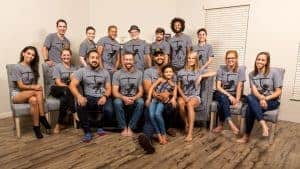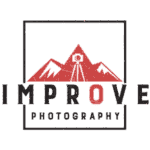Many of you know me as Erica, Portrait Session podcast host and wedding photographer. But here lately, I've been venturing into new, uncharted territory (uncharted for me, at least). This territory is the world of large-scale production management and direction. As my studio transitions away from the retail portrait sphere and toward marketing productions and Kickstarter campaigns, I've been transitioning to production manager and director.

For the past four months, I've been working on a large-scale marketing campaign for Hanga, a sustainably-focused home-goods start-up based right here in Columbus, Ohio. Over the past four months, my studio, UA Creative Studios, has created 55 unique photos and videos for the Hanga Kickstarter page, their social media, and their website. We've also been tasked with developing their Kickstarter page and are currently rebuilding their website.
This large-scale production has taught me a lot about what to do (and not do!) when working on a project of this scale. In an attempt to help out those who come after me, I want to share how I produced a major Kickstarter campaign.
Production Meetings
Production meetings are the veins of a large-scale production. Without these meetings, chaos will ensue and your life will be miserable. Trust me. I speak from experience.

You'll want to start out with a pre-production meeting specifically for concept development. This is when you meet with your main production team to hash out details about the concept, vision, character development, script(s), and goals.
In my case, this pre-production meeting included the client, the director, the producer, the editor, and the manager. But, this meeting can include as many or as few people as you wish.
Pre-Production Prep

You'll want to use your time wisely leading up to the production in order to ensure that the production itself runs as smooth and stress-free as possible.
Your pre-production prep work should include:
- Casting
- Assembling your production team
- Assigning roles to your talent and production team
- Communicating your visions and needs to all involved
- Acquiring props, wardrobe, equipment, hair and makeup artists, wardrobe/set stylists, etc.
- Building sets and/or securing locations
- Having your team sign contracts and model releases
- Creating production timelines
- Putting together a day-of-production agenda
- Testing ideas and proof of concept
Production Tips

Production days can be chaos. But, if you've prepped yourself sufficiently, it can be a breeze (barring any unexpected catastrophes, of course). It's very important that once you've completed all of your pre-production prep work, that you take measures to keep yourself organized and prepared on the day of production.
If you're providing food and drinks for your staff and talent (which I recommend you do), take care of that the day before. Load up on water and other hydrating beverages, check with your team about food allergies, and purchase food or place an order for delivery the day before the production.
The night before the production, confirm times, locations, and responsibilities with all team members. You can never send too many reminders or be too organized.
The morning of the production, make sure that all team members have completed their designated responsibilities. These responsibilities may include food/beverage set up, steaming/ironing wardrobe, hauling lighting and/or equipment, etc.
You should start the day early with staging the scene, styling the talent, and setting up and testing the light(s). This will save you time once the production actually begins.
Once your talent has reviewed their script and you've done your blocking, you're ready to shoot!

Be sure to film/photograph multiple scenes, takes, etc. in order to give your client plenty of options. Shoot more in order to avoid having to reshoot later! Also, if you have any bloopers or mistakes (which I'm sure everyone will have!), keep them! They can make for a funny compilation video at the end 😉
Once production has ended and you've yelled, “It's a wrap!” it's time to clean up. Be sure to gather all equipment and gear, put everything back in its place, and leave the set even better than you found it. And, when you're ready to leave, do one more “dummy check” to make sure nothing has been forgotten.
Post-Production Tips
The first step of post-production is to review and cull all of the footage. If you're working for a client, consider including them in this process. Giving them some ownership of the final outcome is a great way to guarantee client satisfaction. During this time, you should also discuss any final thoughts about the final product, specific editing requests, and music licensing.
Once the footage is culled and you've finalized plans, you can then determine if you need to create more assets or if you're ready to move forward with the editing process.

When editing, make sure you follow the script that was created during pre-production and implement all client requests. Once you have the first draft done, sit down with your client to review the product. Take any feedback and re-edit as needed. Repeat this process until you've reached the point of perfection!
Once the editing is finished, be sure to export the final product(s) in various formats to accommodate for print, social media, websites, etc. Also, be sure to back up everything in multiple places, including at least one cloud-based storage area.
Share It With The World!

Now that production is complete, you obviously need to share it with the world! Part of my work on this Kickstarter campaign included working with a marketer and a social media manager. Here is what I learned by working with them.
- Build hype for your project by posting teasers, behind the scenes photos/videos, etc. during the production process.
- Create a plan of action and/or timeline for sharing the assets on social media. This is especially important if you're creating more than one photo and/or video. When creating this timeline, be sure to consider the days of the week and the times of day that are most popular, which hashtags you want to use, and what your text will be.
- Your ultimate goal in posting your project should be to connect with your dedicated followers. Plan your posts and shares accordingly. Once you've done that, then you can focus your attention on publications, features, going viral, etc.
- Make time to be responsive. You should respond to social media comments and emails in a timely manner. Be personal and make sure everyone who has engaged with your project feels heard and important.

So, there you have it! All of the details for how I produced a major Kickstarter campaign. My experience as production manager and photographer for a production this large was stressful, but so awesome. Being part of a team of over 20 people, creating content that will reach thousands, and watching the progress of the Kickstarter campaign is so wonderful. Although this isn't a direction I originally envisioned for my career as a photographer, I can confidently say that I'm so excited for my transition into this genre.
I'd love for you to take a look at the Kickstarter page and let me know what you think! If you've worked on a production like this, what was your experience?
SaveSave

Nice article helpful in photography if you are feeling bored in your free time then you should loves to play the freecell game in your free time. Freecell is one of the most challenging game playing by people worldwide.